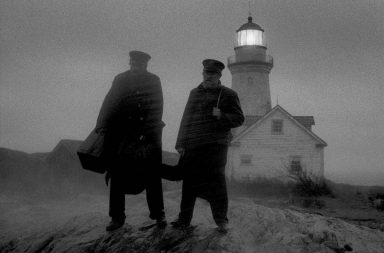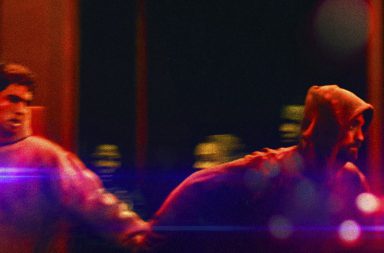As new Hulu limited drama series The Looming Tower just ended, leaving a bitter taste in the mouth and a huge feeling of injustice, we have talked to composer Will Bates about his score for the series. The 41-year-old British multi-instrumentalist, producer and composer is the son of famous late Hammer Films figure Ralph Bates. Throughout his career, he collaborated with many different artists and bands such as former Genesis members Mike Rutherford and Steve Hackett, Lulu, and deep house legend Marshall Jefferson. He moved to New York where he created Fall On Your Sword, a live band which rapidly became a collective of artists and with which Bates began to score ads and films such as the 2011 Sundance Special Jury Prize Winner Another Earth. The composer recently moved to Los Angeles where he also composes for TV series (The Path, Chance, The Magicians, etc.). His recent film work includes I Origins, another collaboration with Another Earth director Mike Cahill, the beautiful documentary Bright Lights about the relationship between the late Carrie Fisher and her mother, Hollywood legend Debbie Reynolds, and the Daniel Radcliffe thriller Imperium.
The Looming Tower marks the third collaboration between Bates and director Alex Gibney, and the second collaboration between the two men and writer Lawrence Wright, after their Emmy-winning documentary Going Clear: Scientology and the Prison of Belief. Based on Wright’s eponymous nonfiction book and featuring an outstanding ensemble cast – Jeff Daniels, Tahar Rahim, Peter Sarsgaard, Bill Camp, Michael Stuhlbarg, Wrenn Schmidt, Alec Baldwin – The Looming Tower offers a highly documented approach on the rise of Al-Qaeda and dives into the whys and wherefores behind the intelligence failure of 9/11. The series is one of 2018’s very best offerings yet, not only because of its creative directing choices where documentary and fiction echo each other but also because of its thought-provoking, sometimes controversial, writing. Scoring a series about 9/11 would be as daunting as writing or directing it, in terms of how broad and at the same time unique the story is. The sparing use of music, though, does not affect in any way Will Bates’s score; on the contrary, his compositions, which go from very textural, sometimes almost imperceptible, to Middle Eastern-inspired with various strange yet beautiful sounds, fit into the telling of this immeasurable tragedy.
The Looming Tower marks your second collaboration with creators Alex Gibney and Lawrence Wright. At what point did you get involved in the making of the series?
Alex had told me about the project and he introduced me to the showrunner, Danny Futterman. That was right when they were still shooting, so I guess I got involved kind of early on: Alex had just finished shooting the pilot and I started talking with Danny, then I wrote some sketches while they were on set and then, when they were done shooting, they went back to New York and I dove right in.
Did you get any directions from the producers?
Yes, I did! There were a lot of discussions during the whole process, and how to go about the score. One of the most important things that we talked about at the beginning was the geographical importance of the music, so that there would have to be some relevance in the instrumentation… You know, it could be slightly Eastern or whatever, but the importance of the story is this quite emotional retelling of the events, so we talked about being thematic and then suddenly cinematic… Danny talked about feeling the score, he didn’t want the series to be packed with music, so the use of music was carefully crafted. I learned a lot from Danny in terms of restraint, because I think we all have a tendency to go full board, but the power of the music in this show comes from the restraint.
I’ve also read that you used Middle-Eastern instruments in the score, and I always find it interesting when electronic music composers incorporate those weird sounds from traditional instruments. How did you elaborate the sound of The Looming Tower?
I actually got the job when I was on holiday in Ibiza and I found a guy on the island who sold this interesting percussion instruments from North Africa and all sorts of weird flutes. There’s an instrument which I think has origins in North Africa and I ended up buying it from this guy – I have no idea how it’s called, but it has an Arabic feel to it. Anyway, I got a lot of instruments from him, and when I got back, there’s a store I go to a lot in New York, it is in West Village, and I bought a lyre there. When I start a new project, I always try some kind of new instruments, some kind of new sounds, something that would inspire me. That was really the case with this, I got my head around these instruments just enough so I could come up with simple melodies, bits and pieces… It was just enough so I could write thematic ideas. So, yes, that was the starting phase to try and get that ethnic flavour. I work a lot with acoustic instruments that I blend with electronics, and we had another conversation, Danny and I, pretty early on, that the score needed to have the emotional human element that comes from real instruments and then, this tension and proportion that comes from the electronics. I also used a musician called Spencer Cohen, who is a fantastic drummer and percussionist, and he plays a lot of unusual ethnic percussion instruments. He and I collaborated a lot, so he plays on the cues too.
The absence of music is significant in the series. I can think of a couple of scenes in the first episodes that would have featured pieces of music if the series had been done by someone else.
I wonder if you’re talking about the interrogation scene…
Yes, it was the first that came to my mind, that one was fantastic!
Yeah, it is incredible! I love the actors’ performances and I think they should be nominated! The absence of music in this scene was really part of it and again, it was already part of our early discussions: the performances are so powerful and the story is so extraordinary that we didn’t have to amplify with music. It just didn’t seem necessary. There are sequences that needed to help push the story along – and generally, those sequences have less dialogue, or at least, they are less performance-driven. But some other scenes already have so much tension on the screen, and probably already on the script, that I think they even decided it on set, they knew they’d nailed it. I think we’re coming back to Danny’s restraint: he is someone who’s really understood the power of music and it’s good and bad, you know, if you hold it back, it can do significant things, but if you overuse it, it loses its ability to draw out the emotion.
The score is also very textural and it never undertones any emotions or feelings. How challenging was that?
I think it’s more of a modern approach, to have that kind of minimalism, and I love it. You know, it’s been a project that I’ve really learned a lot from too, and I think that incorporating acoustic and electronic instruments was a defining sound that I had to find. The story is so broad and the instrumentation is all over the place… One of the big challenges was to find these textures that would unify everything, and one of the ways I did that was processing, weaving, playing on acoustic instruments to help give this unifying texture.
You are now based in Los Angeles, but you lived in New York for quite a long time. Were you there during the 9/11 events?
No, I wasn’t. I moved to New York in 2003, so it was shortly after the events. But that is a day that none of us will forget, we all know what we were doing at that moment. Again, it is the importance of the story: it is a modern tragedy that all of us are conscious of.
Do you think The Looming Tower is going to open a new path to how American fiction, whether it’s cinema or series, handles the 9/11 attacks?
I certainly hope so! I mean, there are details of the story that, obviously, Lawrence had written about in 2006 and shed some light on, but I think generally, the American public aren’t aware of quite how avoidable the tragedy was and how much the agencies failed to protect the American people. In that respect, the story needed to be told and I think putting it in a show like this is quite amazing.
The thing, with the 9/11 terrorist attacks, is that they could never be represented on-screen unless real footage was used, and The Looming Tower is very clever in that it picked up the perfect spot between fiction and documentary.
I think it’s something that comes from Alex, you know, blending narrative and real footage… And from his background, you know, his previous collaborations with Lawrence.
You put together a collective of musicians called Fall On Your Sword, with whom you compose for much more media than just film and TV. Can you tell me a bit about it?
Sure! Fall On Your Sword actually began as an art collective that then evolved into a band, that then evolved into a collective of composers, and it’s really an umbrella for all the projects that I’ve been wanting to do. As it has progressed, I tend to do just the television and film stuff myself, and we have a crew of composers that take care of commercials and things like that that I’ve kind of grew up doing throughout my career. We also do a lot of art installations, we just did one in New York that features these elaborate, interactive and music-driven multimedia pieces. That started as an offshoot of the viral video stuff that we were doing, that then turned into this experiential art thing. Then we started getting approached by brands to create pieces for them.
I guess the only thing you haven’t done yet is a video game; how about that?
Actually, I just did one (laughs)! It came out a couple of weeks ago; it’s a Rainbow Six Siege spinoff. I have to confess I’m not really a gamer. When I got the job, I said, “I haven’t played a game since the Sega Genesis” and they were like, “Oh, really?” (laughs) I’ve never really gotten into it, but I think they kind of loved that and I treated the project like it was a huge movie. It was awesome! And just as the game came out, I think I should buy a PlayStation, I want to finally be able to play this thing.
Interview prepared, conducted and transcribed by Valentin Maniglia
Edited by Marine Wong Kwok Chuen




